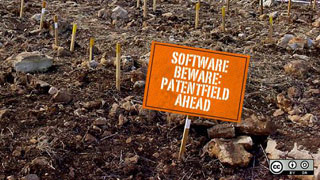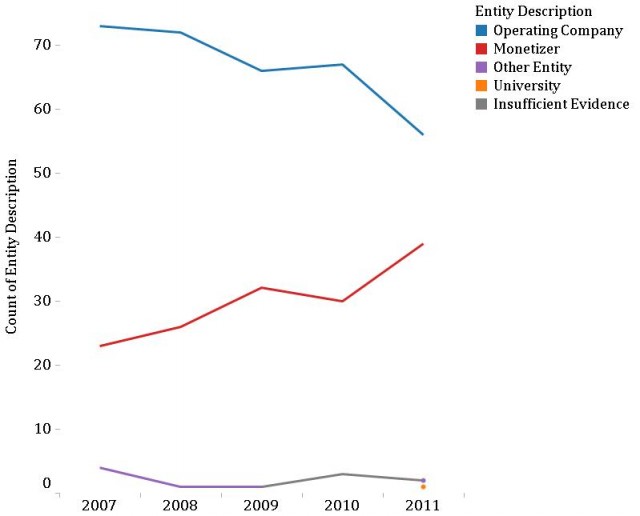
Trolls have long been the standard villain in patent debates. Often little more than an empty office in East Texas, patent trolls produce no useful products themselves but earn millions of dollars by threatening patent lawsuits against productive companies. There is plenty of anecdotal evidence that patent trolls are a serious and growing problem, but until recently there has been little hard data to back up the evidence.
A new study helps to fill the gap by providing systematic data on the growth of patent troll litigation. Robin Feldman, a professor at UC Hastings College of Law, teamed up with Lex Machina, a Stanford Law spinoff that collects data on patent litigation, to compile a systematic survey of patent litigation. Their results are striking: the fraction of lawsuits filed by troll-like entities grew from 22 percent in 2007 to 40 percent in 2011.
The study was inspired by the America Invents Act, last year's largely toothless overhaul of the patent system. In it, Congress asked the Government Accountability Office (GAO) to study the impact of non-practicing entities—a more clinical term for patent trolls—on the economy. Because Lex Machina already had a database of patent litigation, the GAO asked it to produce a random sample of 100 patent lawsuits for each year from 2007 to 2011. In addition to supplying the GAO with the data it needed for its forthcoming study, Lex Machina decided to publish its own interpretations of the sample.
The legal profession has come up with a number of alternative terms for patent trolls—there's also "patent assertion entities." In an apparent bid to make things even more complicated, the authors coined another term, "patent monetization entity," to describe roughly the same concept. Then they went through their sample of 500 patent cases and classified each of them in one of several categories, including operating companies (ordinary tech firms), monetizers (patent trolls), and universities. They found that the monetizers' share of patent litigation has almost doubled in the last five years:

The above graph may understate the effect of patent trolls on the economy for two reasons. First, it shows troll lawsuits as a share of all litigation, but the overall volume of litigation has also been increasing. Second, anecdotal evidence suggests only a small fraction of troll threats ever lead to lawsuits. In most cases, targets settle without going to trial. "From all appearances, lawsuits filed are only the tip of the iceberg, and a major operating company may face hundreds of invitations to license for every lawsuit," the authors write.
The America Invents Act was enacted in the final months of the study period. And there was at least one minor change designed to deter troll behavior: the law made it harder to name many defendants in a single lawsuit. But the law's main provisions, such as the switch from a "first to invent" rule to "first to file" is unlikely to affect the volume of troll litigation. In any event, the authors say their sample is too small to tell whether the AIA had any significant effect on patent litigation. We'll have to wait for future research for a definite answer on that question.
reader comments
37